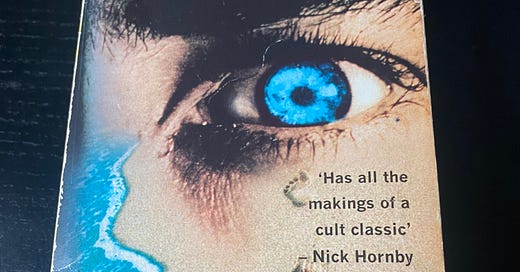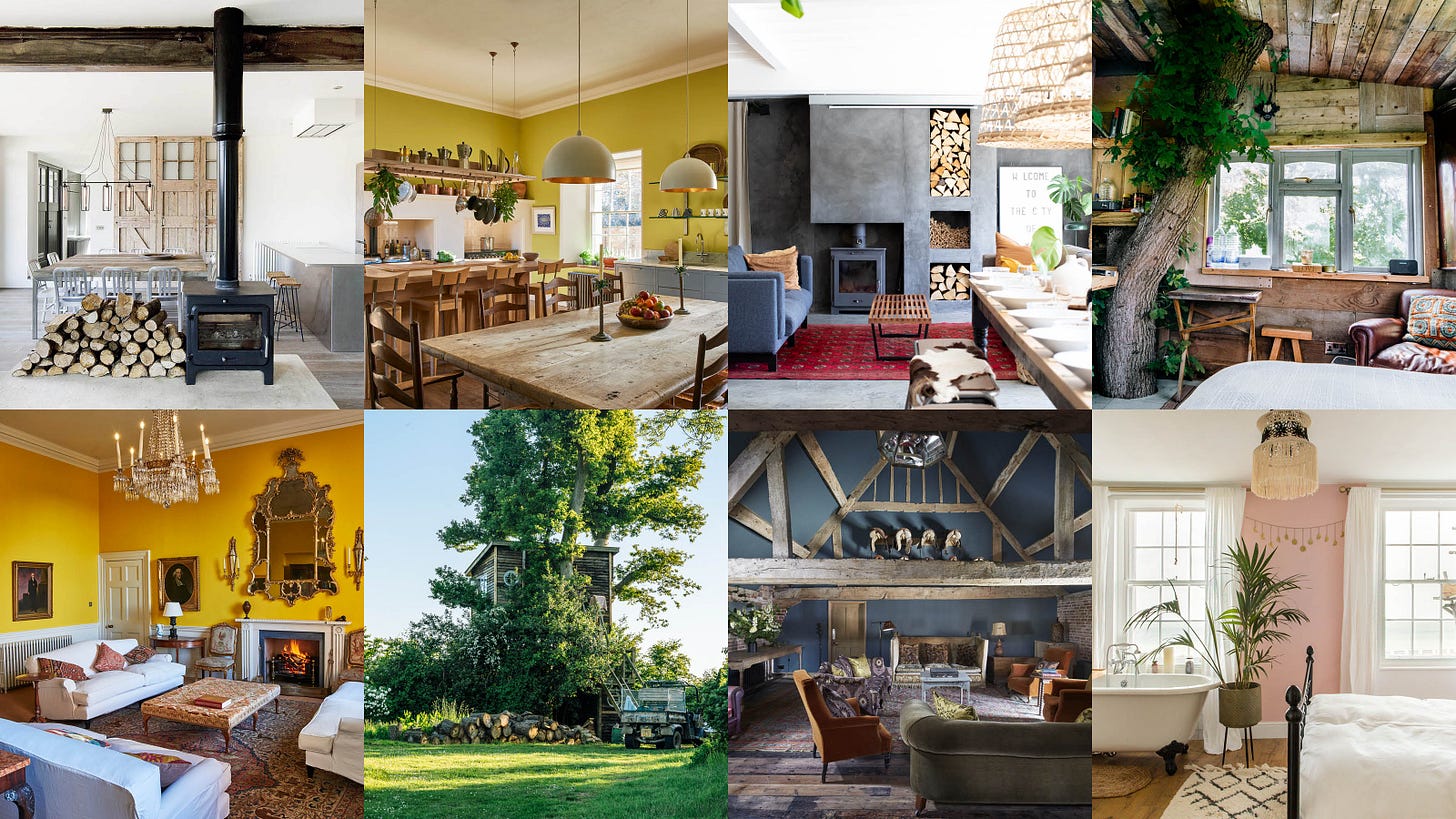Off the beaten track
Thanks to AI and social media, finding novel and undiscovered ideas and experiences is harder than ever. We need to go further to find fresh vibes and ideas.
One of my favourite books is Alex Garland's The Beach. My paperback copy is yellowed and well-thumbed; my Kindle copy is never too far from the top of my recently opened titles. If I'm in the mood for a pure, unfiltered hit of nostalgia, I open the book and stick Whiplash by James on. I'm then immediately transported back to the box room of our old house by Horsenden Hill, staying up half the night while home from uni to finish The Beach for the first time.
Core to the narrative of that novel is the proto-hipster notion of "traveller vs tourist".
Tourists take the beaten paths, clutching their Lonely Planet guides (these days, an Insta carousel or Guardian listicle).
Travellers forge their own paths, finding the roads less travelled.
The tension in the story comes from the fact that the road less less-travelled inevitably makes its way into those same Lonely Planet guides. The best-kept secrets cannot stay a secret forever. We have an innate human desire to share those hidden gems, to create kinship and community, and to assert our status. At heart, we're all wannabe tastemakers, desperate to bask in the glow of being ahead of the latest trends. Like me telling anyone who'd listen about how great The Libertines were back in June 2002, after I had tea with Carl Barat and then saw them play a classically chaotic set at the Manchester Roadhouse. They were so exciting I couldn't not tell anyone about them, even if I knew that by achieving popularity, they'd never play such intimate venues again.
In The Beach, this process of discovering the hidden gems and gradually watching them become exposed to the world is a slow-burn process - the island had been around for years before the first maps of its location started to circulate. In our digitally-driven, smartphone-powered world, the hype cycle around any form of next big thing has been exponentially accelerated and enlarged. If you set The Beach in 2023, it would have likely been just weeks before someone hot-footed it back to the mainland to share some pics and a video for the clout.
Given how much easier it is to share our experiences and our insatiable desire for the next hot "thing", you'd think the whole concept of hidden travel gems would have died out years ago. But, of course, we had a global pandemic essentially shut down travelling for over a year. Even now that travel is unrestricted, cost and climate concerns mean we're only slowly heading back to the pre-pandemic status quo. And that return has coincided with the rise of the latest iteration of the traveller/tourist paradox. What
highlighted last week as "vibe tourism"."The modern tourist cares less about recognisable backdrops, iconic landmarks or famous beachfronts. What's more important is stitching together a collage of micro moments, like editing a mood film. Serendipitous nights at a local watering hole, a spontaneous ride on a vespa with a local stranger, an accidental discovery of a hidden treasure down a dark alleyway." It's a direct extension of the traveller/tourist dichotomy. Vibe tourism isn't just about discovering the spots that the "tourists" never frequent; it's about finding those spots AND capturing the moment in such a way that it appears magical and unplanned. The vibe is all about the feeling - and of course, being able to capture that feeling and share it to boost your algorithmic clout.
Alexi's entertaining piece (you should subscribe to
, one of the best newsletters on Substack) highlights that same, Beach-like tension for vibe tourism. Americans found that Europe in high summer isn't always the perfect canvas for those serendipitous moments. It's sweaty, busy and highly chaotic. "This is the plight of the vibe tourist; they all want a slice of a certain ambience, but the more they hunt for that romanticised feeling of the destination, the more elusive it becomes." And to build on Alexi's points, the more people write about vibe tourism and the more TikTokers flock to capital cities around the world, the more they're likely to run into people like themselves - and the more the whole thing feels like tourism. Checking vibes off a list isn't very vibey.The key to resolving this paradox is remembering that The Beach is a work of fiction. Similar small, exclusive enclaves may have inspired it, but a perfect secret oasis was far-fetched even back in the analogue 90s. The point of hidden gems is that they are few and far between; serendipity doesn't happen every day and at every spot. And if your hidden gem has been written about in a listicle or featured in a vital TikTok, can it still be considered a hidden gem? Not in my book.
But we continue to look for these hidden gems in prominent places because finding the next big thing is hard work and involves trying out a lot of experiences that are definitely NOT the next big thing. I know this through experience - at University, I was an A&R scout for Island Records. My job was to spot hot new bands in Manchester and flag them to the record company. I saw a LOT of sh*t bands; I recommended two out of the dozens I saw to Island. Neither got signed.
In many ways, the process of curating experiences and content that is both exciting and original is similar to coming up with original creative ideas. Countless studies show that your first ideas are often the most obvious - and if they're obvious to you, they'll be obvious to someone else and lack any semblance of originality. Looking beyond the obvious takes a significant time investment and will likely make you feel distinctively uncomfortable. And even if you do get to something which feels original, the idea will still have come somewhere. Nothing comes from nothing.
But maybe machines can help us get beyond the obvious and help us uncover unusual combinations quicker and easier. In his excellent
newsletter, Ethan Mollick highlights recent research comparing AI-powered and human-originated creativity. The meta trends Ethan pulls from the research show that tools like ChatGPT can develop ideas (business ideas and creative writing) that judges felt enhanced human creativity. The exception was for highly creative people - they tended to benefit less from having generative AI support. There was also more "underlying similarity" between AI-generated ideas - perhaps unsurprising given the similarity in their training data.So it does seem that using ChatGPT to side-step the sometimes painful process of getting to original ideas is not currently a viable option. But in that quest for originality, in our desire to steer clear of the hordes and the beaten track, AI can provide multiple ideas at pace. And that is potentially extremely useful, giving you a chance to discount any "float it down the Thames"/"go see the Louvre" ideas relatively quickly. Knowing what you don't want to do, like any good strategic choice, helps narrow your options and focus on areas ripe for further exploration.
Using ChatGPT and other generative AI tools in this “identifying the wrong options”-way is arguably the best method of using AI to support a quest for originality. By way of example, I asked Bing ChatGPT on creative mode for ten unusual things to do in Paris on holiday. One of the options it gave me was to "Experience the magic of Disneyland Paris". Stretching the definition of “unusual” there.
The great democratisation of access to knowledge that the internet, AI and social media have provided has undoubtedly been a good thing. But the knock-on effect is also a sense of flattening, of homogeneity. It used to be all our UK high streets looking the same (to quote Blur's Bank Holiday); now we see similar aesthetics the world over. As Alexi says: "A bistro in Paris is increasingly indistinguishable from a bistro-inspired restaurant in downtown Manhattan or Beijing, all catering to a certain, homogenous Airspace ambience, shaped by the tastes and expectations of the international traveller."
This flattening of ideas, fuelled by ChatGPT and Airbnb/Insta-aesthetics, means that people looking for the surprising, the unusual, and the hidden gems, need to work harder than ever before. To identify the obvious options quickly, then discard them while they continue their quest for something a little more off the beaten track. Looking in different places for inspiration, taking different routes (literally and metaphorically) to see pathways differently. Delving into smaller communities and niche curators in search of a trigger that provides a jumping-off point into a territory that feels more like a traveller's paradise than a tourists' hotspot. Because that's a clear advantage we have over Richard, Francois and Etienne - they were looking for something literally undiscovered; when it comes to ideas and vibes, we only need something that feels fresh and exciting - true originality, like the eponymous beach, is virtually impossible to find.




